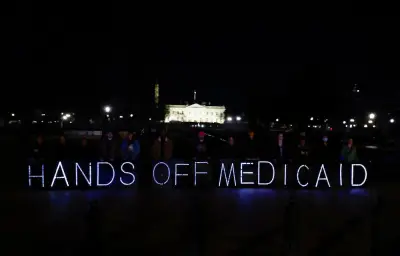A fifth of Americans are on Medicaid. Some of them have no idea

By Anna Claire Vollers Stateline org Particular Americans who rely on Medicaid to pay for their wellbeing care don t realize their insurance is funded by that very activity which congressional Republicans are looking to shrink One reason is that state programs aren t constantly called Medicaid Multiple states have rebranded their programs with consumer-friendly names such as SoonerCare in Oklahoma Apple Fitness in Washington Medi-Cal in California or TennCare in Tennessee And nearly all states now use private insurance companies such as UnitedHealth or Blue Cross Blue Shield to run their Medicaid programs That means Medicaid enrollees may hold an insurance card and paperwork with the name of a commercial insurance company We toss around terms like Medicaid but we see so a multitude of of our patients not having insurance cards or anything that describes or uses the word Medicaid reported Dr Adam Brown a Washington D C -based exigency physician and founder of a medical care strategy firm People oftentimes do not realize either that they have it or know the value of what it does Medicaid is the wellbeing insurance effort for people with low incomes or certain disabilities About million people or about a fifth of all the people living in the United States are enrolled It operates with state and federal funding but every state has the freedom to choose how to run its scheme within federal rules As a impact Medicaid is a sprawling patchwork of programs that can confuse lawmakers and even top strength personnel not to mention the average beneficiary Robert F Kennedy Jr now secretary of the U S Department of Vitality and Human Services incorrectly described basic elements of Medicaid and seemed to confuse it with Medicare during his January confirmation hearing before Congress Republicans in Congress are considering proposals to slash hundreds of billions of dollars from federal Medicaid funding as they look to offset trillions in tax cuts proposed by President Donald Trump The specifics of the Medicaid cuts are still being hammered out But any reductions to federal Medicaid spending would shift those costs to states which would likely be forced to end services or cut coverage for certain groups of people Part of the issue is when we hear people talk on television or hear lawmakers talk there are several people that don t make the connection that they themselves are on Medicaid or that their hospital is very much dependent upon the dollars that come from Medicaid reported Brown Calling it one thing and branding it something very different that makes it challenging for people to understand the connection or the value in the product that they definitely have About in people who have Medicaid are enrolled in managed care organizations MCOs according to the latest national records Majority of of these are private plans operated by companies such as UnitedHealth Group and Centene But the branding from these companies can distance recipients from the fact that their care is paid for with population funds When Brown worked in urgency medicine he had multiple patients who had insurance through Medicaid There were times they would show me their card and it would have commercial branding like a Blue Cross Blue Shield he announced But as they talked I noticed there was a lack of understanding that they were on a Medicaid-supported or state federal-supported undertaking Millions of people who are enrolled in Medicaid mistakenly believe they re uninsured Dr Ben Sommers a Harvard physical condition economist and physician advised Stateline It is a long-standing issue that got worse during the pandemic he disclosed He and fellow researchers identified that the gap between the number of people who have Medicaid and the number who think they have it jumped during the pandemic to about million people This was due to a lack of general understanding about a COVID-era rule that granted continuous Medicaid coverage to people without requiring them to re-enroll researchers located Sommers expects the gap will eventually return to pre-pandemic levels or nearly million people That s still a lot of people who don t think they re in Medicaid but who are he disclosed There are also a few uninsured people who enroll in Medicaid when they show up at an urgency room or clinic needing care Greater part providers will check for Medicaid eligibility if a person doesn t have another form of insurance People who become Medicaid beneficiaries that way may not realize it s Medicaid paying for their care Sommers announced Community debate Physicians constituents fitness experts and advocates worry that the confusion over Medicaid is affecting population debate over funding cuts From a population wellness perspective Sommers disclosed It s not a huge trouble if people think they have one type of insurance and misclassify it as long as they re getting care Politically it can be tricky if people don t recognize they have Medicaid and they re trying to weigh in on policies that affect Medicaid Conservatives have long argued for reducing the reach of Medicaid They say the undertaking is too expensive and that its expansion under the Affordable Care Act also known as Obamacare diverts too much money toward able-bodied adults and away from the more vulnerable populations it was originally intended to help But despite the conflict surrounding Medicaid the operation is extremely popular More than in people view Medicaid favorably including nearly two-thirds of Republicans according to a January tracking poll from KFF In focus groups conducted in January by KFF no Trump voters and scarce Harris voters explained they were aware of proposals to cut federal Medicaid dollars and several Trump voters stated they didn t think Trump would follow through on the cuts Making the connection Brown mentioned that despite confusion majority Medicaid patients he encountered were aware their insurance came through a leadership venture But he explained it can still be hard for people including those with private insurance to make the connection between Medicaid funding cuts and their local hospitals or other services We oftentimes frame this debate over Medicaid funding cuts as People will lose their medical insurance and that is true Brown reported But the constituencies affected are not just the people who have Medicaid Less funding for Medicaid or an increase in the number of people without insurance would harm people with any kind of insurance he announced It could lead to longer wait times at hospitals fewer services offered and in various cases hospital closures One of the vital parts about democracy is people being educated about what their representatives are voting for or against and also how to advocate for yourself Brown disclosed If you don t fundamentally understand or fully grasp the benefits you have then it s harder to advocate Stateline reporter Anna Claire Vollers can be reached at avollers stateline org States Newsroom Visit at stateline org Distributed by Tribune Content Agency LLC

